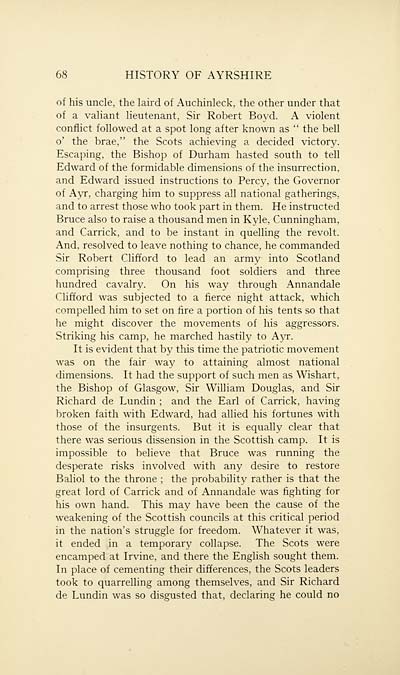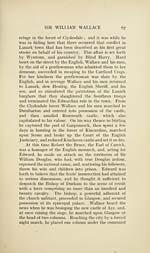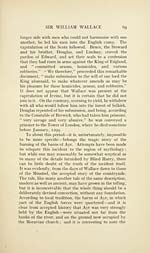Download files
Complete book:
Individual page:
Thumbnail gallery: Grid view | List view

68 HISTORY OF AYRSHIRE
of his uncle, the laird of Auchinleek, the other under that
of a valiant lieutenant, Sir Robert Boyd. A violent
conflict followed at a spot long after known as " the bell
o' the brae," the Scots achieving a decided victory.
Escaping, the Bishop of Durham hasted south to tell
Edward of the formidable dimensions of the insurrection,
and Edward issued instructions to Percy, the Governor
of Ayr, charging him to suppress all national gatherings,
and to arrest those who took part in them. He instructed
Bruce also to raise a thousand men in Kyle, Cunningham,
and Carrick, and to be instant in quelling the revolt.
And, resolved to leave nothing to chance, he commanded
Sir Robert Clifford to lead an army into Scotland
comprising three thousand foot soldiers and three
hundred cavalry. On his way through Annandale
Clifford was subjected to a fierce night attack, which
compelled him to set on fire a portion of his tents so that
he might discover the movements of his aggressors.
Striking his camp, he marched hastily to Ayr.
It is evident that by this time the patriotic movement
was on the fair way to attaining almost national
dimensions. It had the support of such men as Wishart,
the Bishop of Glasgow, Sir William Douglas, and Sir
Richard de Lundin ; and the Earl of Carrick, having
broken faith with Edward, had allied his fortunes with
those of the insurgents. But it is equally clear that
there was serious dissension in the Scottish camp. It is
impossible to believe that Bruce was running the
desperate risks involved with any desire to restore
Baliol to the throne ; the probability rather is that the
great lord of Carrick and of Annandale was fighting for
his own hand. This may have been the cause of the
weakening of the Scottish councils at this critical period
in the nation's struggle for freedom. Whatever it was,
it ended in a temporary collapse. The Scots were
encamped at Irvine, and there the English sought them.
In place of cementing their differences, the Scots leaders
took to quarrelling among themselves, and Sir Richard
de Lundin was so disgusted that, declaring he could no
of his uncle, the laird of Auchinleek, the other under that
of a valiant lieutenant, Sir Robert Boyd. A violent
conflict followed at a spot long after known as " the bell
o' the brae," the Scots achieving a decided victory.
Escaping, the Bishop of Durham hasted south to tell
Edward of the formidable dimensions of the insurrection,
and Edward issued instructions to Percy, the Governor
of Ayr, charging him to suppress all national gatherings,
and to arrest those who took part in them. He instructed
Bruce also to raise a thousand men in Kyle, Cunningham,
and Carrick, and to be instant in quelling the revolt.
And, resolved to leave nothing to chance, he commanded
Sir Robert Clifford to lead an army into Scotland
comprising three thousand foot soldiers and three
hundred cavalry. On his way through Annandale
Clifford was subjected to a fierce night attack, which
compelled him to set on fire a portion of his tents so that
he might discover the movements of his aggressors.
Striking his camp, he marched hastily to Ayr.
It is evident that by this time the patriotic movement
was on the fair way to attaining almost national
dimensions. It had the support of such men as Wishart,
the Bishop of Glasgow, Sir William Douglas, and Sir
Richard de Lundin ; and the Earl of Carrick, having
broken faith with Edward, had allied his fortunes with
those of the insurgents. But it is equally clear that
there was serious dissension in the Scottish camp. It is
impossible to believe that Bruce was running the
desperate risks involved with any desire to restore
Baliol to the throne ; the probability rather is that the
great lord of Carrick and of Annandale was fighting for
his own hand. This may have been the cause of the
weakening of the Scottish councils at this critical period
in the nation's struggle for freedom. Whatever it was,
it ended in a temporary collapse. The Scots were
encamped at Irvine, and there the English sought them.
In place of cementing their differences, the Scots leaders
took to quarrelling among themselves, and Sir Richard
de Lundin was so disgusted that, declaring he could no
Set display mode to:
![]() Universal Viewer |
Universal Viewer | ![]() Mirador |
Large image | Transcription
Mirador |
Large image | Transcription
Images and transcriptions on this page, including medium image downloads, may be used under the Creative Commons Attribution 4.0 International Licence unless otherwise stated. ![]()
| Histories of Scottish families > Ayrshire > Volume 1 > (78) Page 68 |
|---|
| Permanent URL | https://digital.nls.uk/95195222 |
|---|
| Attribution and copyright: |
|
|---|
| Description | A selection of almost 400 printed items relating to the history of Scottish families, mostly dating from the 19th and early 20th centuries. Includes memoirs, genealogies and clan histories, with a few produced by emigrant families. The earliest family history goes back to AD 916. |
|---|

